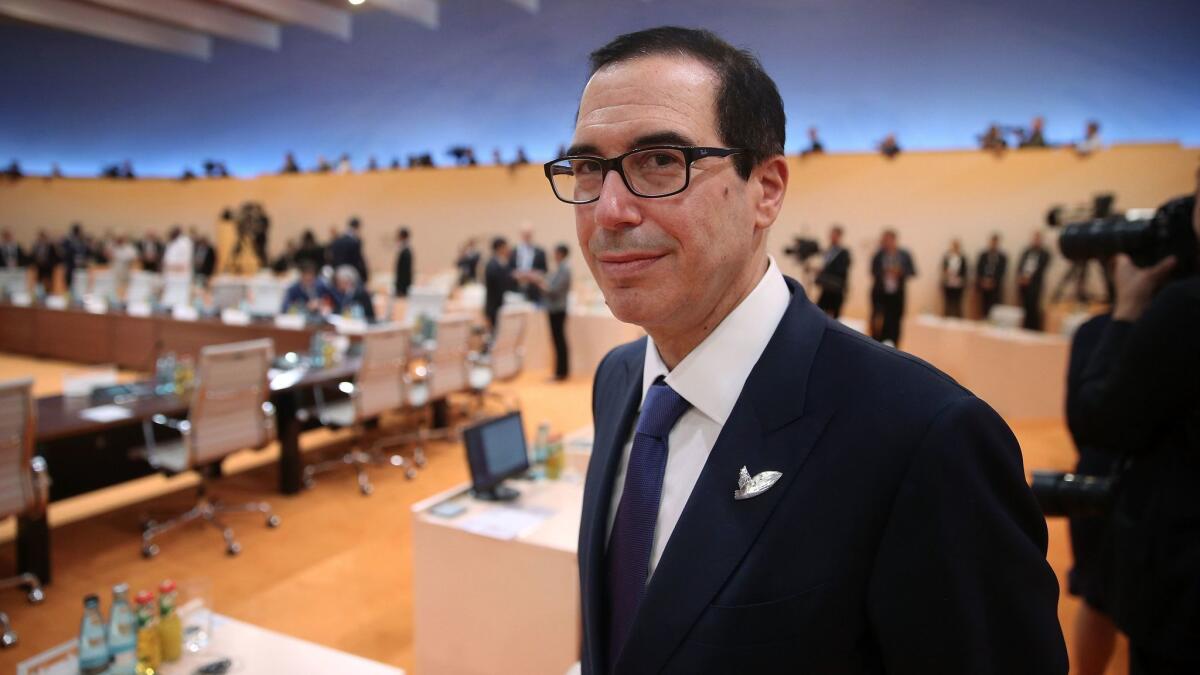Op-Ed: The six categories of Trump apologetics

Now that Donald Trump Jr. has confessed to organizing a campaign meeting with a Russian lawyer said to have “information that would incriminate Hillary” Clinton as part of “Russia and its government’s support” for his father, we can say with ironclad certainty that special counsel Robert S. Mueller III’s investigation will be the single dominant story in President Trump’s first term.
Which means we can also be sure that in front of us stretch months and years of contortionist apologetics from Trump loyalists, partisan commentators and C-list opportunists. Recognizing their patterns of defensive dissembling will not only help clear away some of the fog, but also provide a cautionary tale to all of us about the intellectual degradations of sucking up to power.
Some broad categories of hand-waving are already familiar to us here at the halfway point of Trump’s first year. The notorious fake news head-fake. The whataboutism: “Why aren’t the same standards placed on the Democrats,” the president complained yesterday. “Look what Hillary Clinton may have gotten away with.” And the anti-anti-Trump school of commentary that reserves its most fiery wrath not for the person atop the world’s largest nuclear arsenal but for the inevitable media hysterics bungling facts and shrieking “treason!”
By such means are the last tottering norms of political decency bulldozed.
But recent days have highlighted three other genres of throne-polishing that are sure to mark the next phase of Republicanism’s moral descent.
Two plus two DOES equal five!
In the 13 hours between Trump’s tweet Sunday that he had discussed with Russian President Vladimir Putin “forming an impenetrable Cyber Security unit so that election hacking, & many other negative things, will be guarded,” and his later clarification that he doesn’t necessarily “think it can happen,” some administration officials leaped into the breach to make this obvious nonstarter look like a genius plan.
“I think that this is a very important step forward,” Treasury Secretary Steven Mnuchin said on ABC’s ”This Week.” “This is like any other strategic alliance, whether we’re doing military exercises with our allies or anything else. This is about having capabilities to make sure that we both fight cyber together, which I think is a very significant accomplishment for President Trump.”
This has been a recurring pattern these last six months: Either the president floats an absurd trial balloon that he later pops (secret White House tapes, anyone?), or he lets his underlings vociferously deny a report that he later confirms. As Los Angeles Times columnist Jonah Goldberg wrote over at National Review, “If there is one thing we’ve learned from this president, it’s that going too far out on a limb brings out the saw.”
The inverted Rumsfeld
Remember how former Defense Secretary Donald H. Rumsfeld was fond of saying that “the absence of evidence is not evidence of absence”? Though controversial in Rumsfeld’s application to the more discretely measurable question of whether Saddam Hussein was hiding weapons of mass destruction in Iraq 15 years ago, the age-old observation contains the tautological truth that there might be stuff we haven’t learned yet.
Trumpists have replaced the inherent humility of this proposition with a premature, pugnacious certainty that all wrongdoing has been definitively ruled out. “I don’t know what else the mainstream media can talk about other than the fact that there was no collusion” between Russia and Trump, former campaign manager Corey Lewandowski said as recently as Saturday. “There was no coordination. Now, the president is taking this issue directly to the president of Russia and raised it, so now I think the issue is officially dead.”
Having serially failed to produce full public exonerations from Director of National Intelligence Dan Coats, National Security Agency chief Michael S. Rogers and former FBI Director James B. Comey, Trump and his underlings just keep stating his innocence as fact. It is less true by the day.
The goalpost transplant
Donald Trump Jr. and various members of the administration have been caught up in repeated, sometimes belligerent lies about whether members of the Trump campaign met with various Russians in 2016. Confronted on CNN with this track record — and asked point blank, “Was it a good idea for Don Jr. to meet with this Russian lawyer?” — deputy assistant to the president Sebastian Gorka trotted out some whataboutism (“Was it a good idea for the DNC to send its operatives to the Ukrainian Embassy?”) before declaring that the meeting was just fine because Trump was a “private citizen,” and digging for dirt “is what political campaigns do.”
By such means are the last tottering norms of political decency bulldozed. Republicans rightly criticized Clinton and her apologists for serially lying about her handling of emails as secretary of State. They were correct in roasting President Obama for endlessly prevaricating about so many aspects of his signature legislative accomplishment. Those who participate now in the whitewashing of an administration’s mounting pile of bull are not only soiling themselves, but encouraging their political adversaries to treat legitimate criticism like a cynical partisan club.
We will not soon climb out of this 21st century political black hole we find ourselves in until we begin holding everyone to a higher standard, beginning with ourselves.
Matt Welch is editor at large of Reason, a magazine published by the libertarian Reason Foundation, and a contributing writer to Opinion.
Follow the Opinion section on Twitter @latimesopinion or Facebook
More to Read
A cure for the common opinion
Get thought-provoking perspectives with our weekly newsletter.
You may occasionally receive promotional content from the Los Angeles Times.










